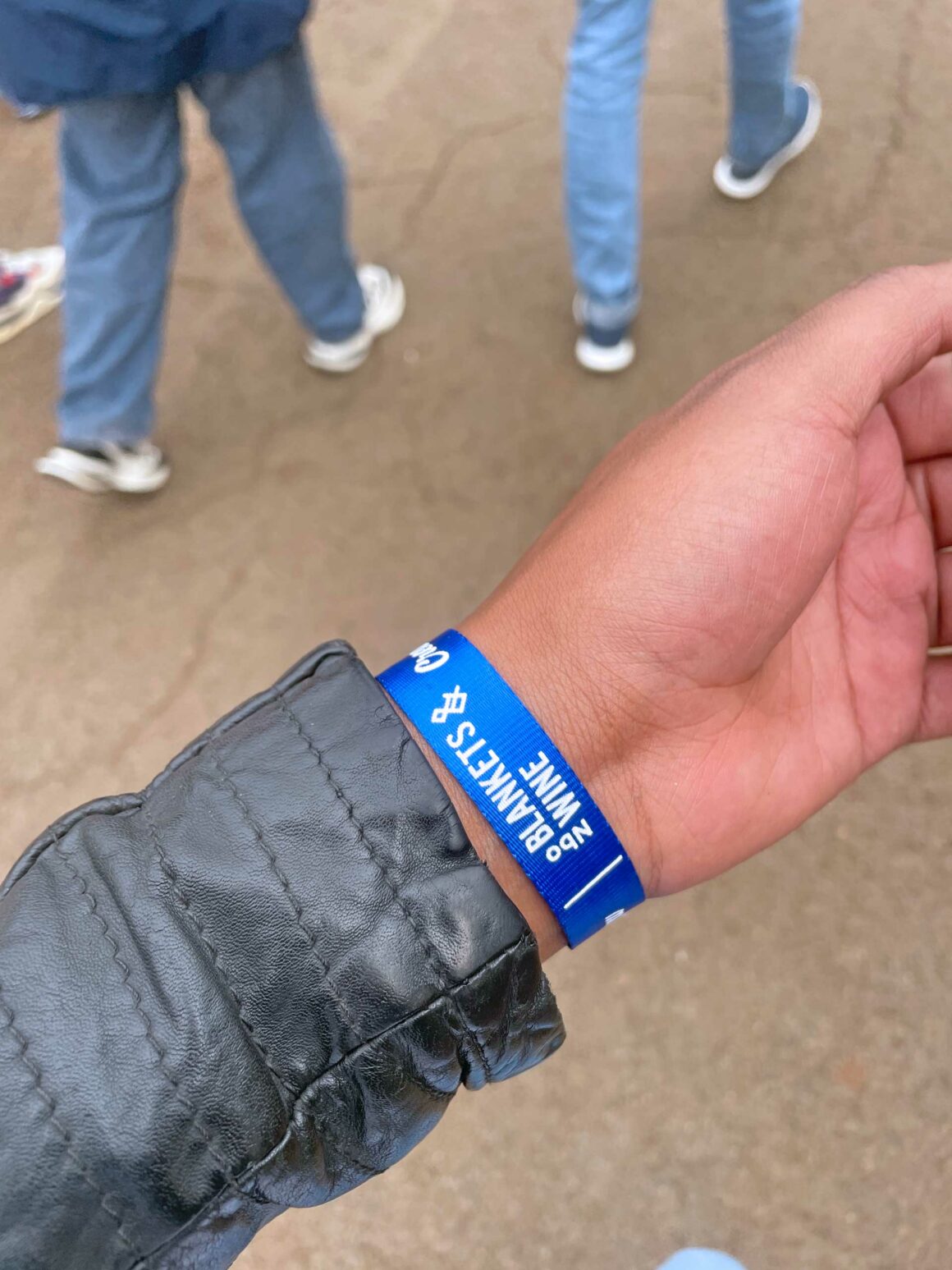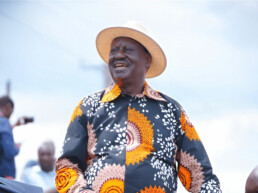Since its inception in 2008, Blankets & Wine Festival has become a staple in the Kenyan music calendar. Even after moving from a monthly to a quarterly schedule, Blankets & Wine seems to always be aiming for the stars, reaching them and surpassing them. The latest Blankets & Wine edition took place last week on Sunday 28th September. Nigerian artist Tems was headlining the show with a total of 8 acts on the main stage and an accompanying 10 acts on the Onja Onja stage. In an industry where events and festivals spring up and then quickly collapse, Blankets & Wine has done well in maintaining its run for 16 years making it a top destination for many Kenyan acts looking to break through. This last event was no different, highlighting why such festivals matter.
My biggest gripe with a festival of that magnitude falls more on the side of hospitality and catering, whose poor execution cannot be understated. Arriving at the Kasarani Laureate Gardens was a smooth experience. The ticketing for the event was also quite efficient with multiple checks to ensure a quick and easy entry. Stepping onto the grounds themselves, the energy was palpable. Pedestrian entry brought me right to the Onja Onja stage, a rather new addition to the festival that ensures maximum coverage of diverse music tastes. There were many vendors on location selling everything from food to clothes, art pieces, sunglasses and even offering body art and temporary tattoos. From the look of things, the festival was going well. On the main stage, Billy Black was wrapping up his set. It was beautiful and the sound was amazing but according to the schedule, he was late.
Then came the first change over to Flier which took over 30 minutes. This was a telltale sign of what was to come later on in the evening. Flier’s set for a debutante was fantastic. Having only released his first music video weeks prior to the festival, the crowd loved it. The band was also well rehearsed maintaining a tight groove, with solid transitions between the tracks. Then came trouble. Thirst had descended upon me. Walking around the festival grounds now felt different. The crowd had started growing as was expected. Around the main stage were the main bars. Two to be specific. I made my way there to a not very crowded bar, which I came to find out was because, to my and everyone’s surprise, the bar was not open, thus not selling drinks. All they could offer after a little negotiating was a cup filled with ice then I was off to the races trying to find this life giving liquid. And off to the races I was making my way to the main food court set up at the Onja Onja stage. Nobody seemed to be selling water here either. All I could get was a glass of sugarcane juice, a quick bite and back to the main stage for Zaituni’s performance.
Zaituni
For an artist having a breakout year, Zaituni’s set highlighted everything right with talent management, staying true to your craft and putting in the work. There was a section that had a Mwanzele breakdown and it felt spiritual. The spirit of Bi Kidude and all the female Taarab singers who made Zaituni possible descended upon the stage as Zaituni belted out tunes from her latest EP ‘Labor of Love’. As she sang her breakout single ‘Tamu’, it was evident that Zaituni is here to stay. Another commercial break and now I’m really thirsty. Off to look for water, again. This time, I also needed to use the washrooms. Not only was the signage directing you to the washrooms’ location missing, there was also an information silo. All the staff I asked for directions to the washrooms pointed me to the Onja Onja stage which was quite honestly far from the main stage. Off to the washrooms I went. When I located them, there was no signage nor labels to inform you which ones to use and I almost ended up being a creep by entering the ladies’. This was a major inconvenience for a festival so huge. To add salt to injury, stewards and service staff did not seem very interested in ensuring that attendees made their way to the proper designated areas for their nature calls. It was a mess.
Water
A walk around the food court once again revealed the lack of water for sale by vendors. As I made my way back to the main stage, I went by the other main bar where I was quickly informed that this bar was only for preordered drinks. This information had not been made clear to me in advance. Further, there was no water at the main bar and if it wasn’t for a former schoolmate who informed me that I might have better luck at the Pepsi tent, I would have died of thirst. With all this preordering business looking like a failure from the onset, the first come first served, survival for the fittest nature of festivals seemed more enticing now more than ever. So off to the Pepsi tent I went and here came my second issue with Kenyan festivals. This is not specific to Blankets & Wine but it is a major pain point when it comes to events in Kenya.
Network Hiccups
It is 2025. All of our lives are lived on our phones, from contacting people to making payments. This begs the question of why event organisers don’t partner with Telcos to boost network bandwidth for the specific hours where traffic is peak. Or even better yet, have the telcos provide temporary cell towers to boost networks at a venue during such events. At the Pepsi tent, drink in hand, M-Pesa app went dead on me, same as MySafaricom App. I made my way to the now dreaded toolkit to make the payment and waited for almost a minute for the M-Pesa message to arrive. The Pepsi tent also seemed overwhelmed as they were the only ones (at least to my knowledge) who were selling water. Twitter sentiment seems to indicate that Pepsi did not want water to be sold at the event. Given how partnerships and bar and food rights at events go, this made sense. Wouldn’t it be sensible however, for them to sell the water to other vendors who would sell to attendees? It’s water for heaven’s sake.
We are Nubia
Anyway, back to the main stage for We are Nubia’s set, another duo who are having an amazing 2025. And so it begins, but Maggie and Gloria were not audible. From my position next to the Front of House (FOH) booth, I could see the engineer fiddling through the mixer trying to find their mics which were on mute. That was quite disappointing but it also happened again during their breakout single ‘DND’ with Zaituni whose mic was off for half of her verse. I even thought they would repeat the song but their monitors seemed fine, the only problem was the main speakers. We are Nubia gave an amazing marred performance interlaced with choreography and amazing crowd control in between songs. Again, the preparation from the duo and their band was quite evident and thrilling to watch. For a duo that dynamic, the Image Magnification (IMAG) Screens were doing them a disservice. The camera kept staying on the wrong artist for entirely too long or not at all. This may have been an issue with the camera person assigned those duties but the IMAG screens and overall camera work improved as the festival went on.
Another commercial break and another changeover.
The allocated time had now been pushed up by almost an hour. And then came the most pleasantly surprising show of the night, Chimano. To say that Chimano commanded the stage would be an understatement. The only thing lacking from Chimano’s performance was the FOH sound. It was horrendous to say the least. The backing track was too loud, overshadowing the live vocal performance that Chimano was so effortlessly displaying. The choice to go with a headset microphone was also a fabulous move although a better microphone choice suited for a live environment would have better served the occasion. He sang, danced, served looks all the while never seeming out of breath or even out of place at a sold out Blankets show as a solo debutant. While all this was happening, the realization of what Sauti Sol had done to the Kenyan industry suddenly dawned on me.
Sauti Sol
While people complained about Chimano’s use of Sauti Sol songs later on, the disingenuous nature of the complaint seems to be anchored on the fact that the members should be performing their own songs. Sauti Sol however spent close to 20 years of their lives creating these songs and thus they belong to all of them individually and collectively. Again, the sound engineer during his set did a great disservice to an otherwise magical and exceptional performance. The Jukebox Band held it down with very tight transitions giving the songs a new lease of life. The stripped down version of ‘Monster’ transitioning to ‘Nenda Lote’ was such a fantastic eargasm that I would give everything to hear again. Have I said that the FOH engineer really failed Chimano?
I once again needed to respond to nature’s call. This time, I asked security if there were other washrooms apart from those at the Onja Onja stage. To my surprise, they pointed me to another station closer to the main stage but hidden by the vendor tents. Again, I had to risk embarrassing myself as the ladies’ and gents’ were not clearly labeled. At this station and with alcohol already flowing in everybody’s system, it seemed that it was a first come first serve basis for all the washrooms. Ladies in gents’ and vice versa. Another thing to note was how exposed the porta potties were. I am not looking for a reason to complain, but I think this is such a simple consideration for washrooms. It looked sporadic, almost like kiosks on the road. So why wasn’t there signage? Or at least visible signage? The crowd was now in full tilt. The main stage was packed. I bumped into a few familiar faces which is always pleasant at such events. And I was back to the main stage for Toxic Lyrikali. This time however, I was able to get access to the FOH area.
Toxic Lyrikali
With my new position at FOH secured, Toxic came out to mad hype, his set was really one of a kind. The engineering during his set was exceptional. The engineer, Tosh kept Toxic’s vocals upfront allowing his rapping to carry the performance as opposed to the band. Toxic’s crowd control was somewhat lacking but he made up for it with how tight his band was and how exceptional his voice and breath control was. I’m assuming this was his first time performing with a live band and boy, did he deliver. Up next was Joshua Baraka before the headliner, Tems, took to the stage. Muthoni Drummer Queen, the founder of the festival took to the stage to inform the crowd that Tems would be performing before Baraka. I think this was a consequence of time as Tems’ changeover was supposed to start at 8 PM after Baraka’s performance but it was 8PM and Baraka had not yet performed, so he was bumped. I feel this was a great injustice not only to Baraka but also to the crowd in attendance.
And so we waited. Tems had her own engineering team running both FOH and her monitors. The state of the art Digico mixer I was staring at promised a great show. For an hour, yes, an hour, the crowd listened, disgruntled, to the FOH engineer’s playlist. This highlights another problem with the festival set up. It would have been more acceptable to have a DJ play live, especially during such a long changeover. An extra stage would have also diffused the crowd and kept them engaged during this long changeover.
Tems
After more than an hour of waiting, Tems hit the stage to quite a respectable applause from the crowd. Her laid back energy left a lot to be desired. After what we had witnessed with Toxic, the energy shift, music wise, was quite noticeable. But Tems serenaded the crowd, showing her love to Kenya and expressing her desire to move here. Down the stairs she went to find her boo. This was quite honestly the most entertaining part of her set. I would be remiss not to highlight that despite her own mixer and engineer, I didn’t hear that much improvement in sound quality during her set. At the risk of being pedantic, her background vocalists were buried in the mix leaving only Tems to shine. At one point as Tems was performing ‘Love Me Jeje’, the speakers went dead. The look of horror on her engineer’s face was a confirmation of how horrible this was. Everyone looked at the laptop running the DSP for the festival and nothing was getting to it. The mixer was still receiving inputs only that the speakers were dead. The recovery from everyone on ground was amazing with the system shutdown lasting about 5 seconds. Overall, I think her core fans really enjoyed the show as the crowd’s energy was up there the whole time she performed. After the show, the bars, still crowded; the washrooms, as chaotic as ever.
Joshua Baraka
After a rather quick changeover, Joshua Baraka hit the stage. This was the best performance of the night. Given that a portion of the crowd left immediately after Tems’ performance, Baraka would have really delivered a world class show as a curtain raiser for Tems. But I loved every minute of it. Jack Odindo, the FOH engineer for Baraka, saved the day after that Tems’ performance. He concentrated on the mixer, delivering the best sounding mix of the night. Mutoriah and The Movement Band backed up Baraka’s outstanding performance delivering a blend of very tight transitions with the most interesting music arrangements. Baraka brought out the sultry Maya Amolo to perform their song ‘Bend It’. It would be irresponsible not to mention Maya Amolo’s sophomore album ‘The Sweetest Time’ which was released in September. Then came other guest surprises in Bien and Mr. Tee. Baraka’s performance of ‘Wrong Places’ instantly turned me into a fan. Joshua Baraka was the epitome of stealing the show.
For me, that was the end of the night. But now came another pain point on such nights. It was well past midnight and my only means of transport was a taxi. Taxi hailing apps like Uber and Bolt had crazy surges to the point where they literally crashed refusing to show prices for the trips. Once I made it home, I simply reflected on what a night it had been. All the performers came prepared and held their own. The lack of signage all over the festival grounds and the lack of proper service infrastructure for drinks and food turned what would have been a wonderful night into an average experience riddled with technical issues and unforgivable flaws in service and hospitality.
Bigger Stage, Worse Experience
Blankets & Wine has created a space for artists to not only find their voice but also to express themselves and give fans an opportunity to discover new music. While they have remained relevant, the bigger the festival has gotten, the worse the experience has become. For a festival whose regular tickets cost Kshs 4000, a lot is left to be desired. While Blankets & Wine had people initially bringing their own bottles of alcohol, this new push to sell drinks at the expense of convenience and enjoyability, all for profit, has made the cultural cachet of the festival fall far off. Moving to its more intimate roots and maybe only allowing wine while selling hard liquor and water may be one possible way out for the music festival.
Music festivals within the entertainment industry should be places where discovery and enjoying live music are in focus. Crowd management, bar dispersion, proper signage and multiple stages are table stakes affairs, and entirely not the sort of challenges a premiere music festival is expected to be experiencing after so many years in the game.
Victor Muia
Victor Muia is an audio engineer, music producer, music writer and content creator. Going online as @megamuia, Victor seeks to draw a link between the past and present cultures of music especially through sampling.





